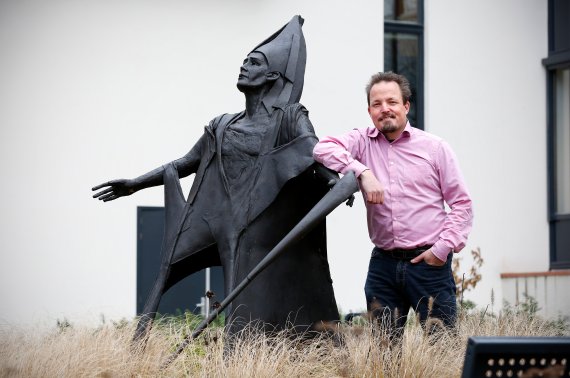Perry den Brok by the statue of De Leermeester in front of the Leeuwenborch. A mini version of the statue is given annually to the Teacher of the Year. © Aldo Allessie
1. Evaluate educational innovations better
‘The university spends over a million on educational innovations every year. A good thing in itself, but there’s something odd: you can only find an evaluation for 15 of the 88 innovation projects of the past three years. That means that in 80 per cent of the projects, money has been spent without anyone at a higher level checking whether the project was successful. An innovation project can fail, but then you do want to know that it failed, and why. It’s okay to fail, but you want to learn the lessons from failures.’
Brok is chair of the 4TU Centre of Engineering Education, a joint project by the three Dutch technical universities and WUR, he explains. ‘On that centre’s website there is an online innovation page, with a lot of the educational innovations at those universities and you also see what lessons were learned from which projects. By using something like that you can prevent people from making the same mistakes again and again.’ So WUR needs to go about things in a more ‘evidence-informed’ way, says Den Brok. ‘Don’t get me wrong, it’s a very good thing that there’s an innovation fund. But reserve some budget for evaluations. A bit less money for innovations and a bit more for evaluating them.’
2. Maak het onderwijs flexibeler en meer modulair
There was a time when people thought MOOCs (Massive Online Open Courses) would turn the world upside-down, says Den Brok. ‘In the end they turned out to be just a small step forward. And yet the MOOC has had more impact on education than most people realize. Thanks to MOOCs, we are learning better ways of dealing with large groups of students. And education is becoming more flexible and more modular. On a MOOC you can get a certificate for individual components, which is valid elsewhere. Imagine: someone comes here to follow a degree programme, but has already got certain certificates, which we accept. That student can then complete a degree in a shorter time.’
As a university we could decide that we want to take the lead in life-long learning
This concept is increasingly being applied on teacher-training programmes, says Den Brok. ‘To make it easier for them to go into education after all, teacher-training programmes are now divided into modules. Students can do these as electives on their Bachelor’s and Master’s degree programmes. That way they can get course certificates that might, for example, qualify them to teach at lower secondary school level. Some teacher training programmes are even going so far as to see whether students can do the last part of their Master’s while already working. That gives you a smooth transition: getting some modules of the teacher-training programme during your subject-related degree programme and finishing it off afterwards – on the job.’
This flexible, modular way of learning could be rolled out far more extensively, thinks Den Brok. ‘As a university we could decide that we want to take the lead in life-long learning. And be pioneers in modular education.’
3. Coach students in deciding which direction to go in
‘The Life Sciences graduate of the future has got to be a kind of superhero, with superpowers,’ says Den Brok. He is referring to a long list of qualities that alumni have to live up to, according to WUR’s educational vision. In random order, they must be inquiring and creative thinkers; have a nose for policy and for the market; be flexible, analytical and reflective; be competent to handle scientific knowledge and to write, argue and debate; be capable of intercultural and interdisciplinary collaboration; show leadership qualities and possess and strive for excellence.
And that’s just for starters. Extremely ambitious, says Den Brok. ‘You can never manage all that. So a student has to make choices: where does your heart lie, what drives you, what is your profile going to be? There are more and more options nowadays, so making good choices becomes more and more important. For example, as a student, you are now expected to think about whether you want to work with people, give advice, or maybe be more of an entrepreneur. In the old days, the emphasis was only on the subject matter.’
Students have to make choices: where does your heart lie, what drives you?
The solution: more coaching on making choices and on professional identity. ‘Students can now choose for themselves which skills they want to learn. They should have to defend their choices. Then they will give them more careful thought.’
4. Streamline the educational ecosystem and design clear learning trajectories
Educating ‘superheroes’ calls for a special learning environment, says Den Brok. ‘That’s why I prefer to talk in terms of an educational ecosystem. The term ‘learning environment’ tends to make us think of traditional lectures and classrooms. In an ecosystem there is also a place for virtual learning – online or in games – and for learning through writing a business plan, internships, simple commercial activities, Academic Consultancy Training or a Student Challenge.’
Many of the components of this kind of modern educational ecosystem are already in place in Wageningen, says Den Brok. ‘Only it is still a bit ad hoc. Now students often go on internships towards the end of their degree programmes. Then the student is suddenly expected to be able to do all sorts of things that have not been covered – or not adequately – in earlier courses. By making the required skills part of your education, you can prepare students better for this. In short: zoom out and design learning trajectories for those skills, in which those separate components of the education ecosystem are more streamlined.’

